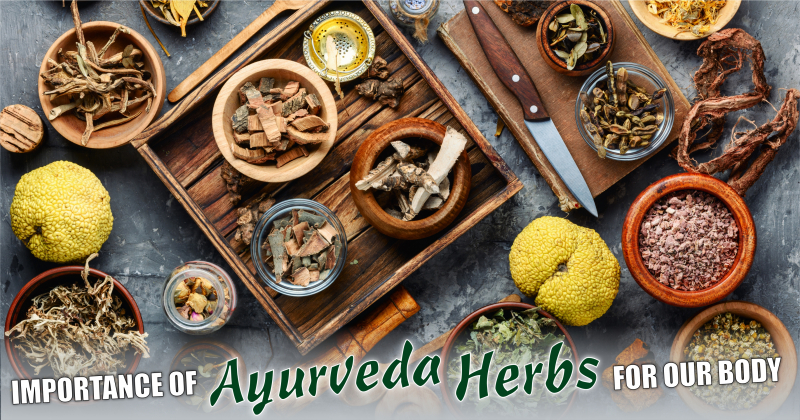
October 08, 2021 03:03 Created by Admin, Last modified on November 03, 2021 10:07
Ayurvedic herbs are a key component of Ayurveda, the traditional practice of medicine of India. Practitioners will generally use ayurvedic herbs to "cleanse" the body, boost defense against disease, and keep the mind, body, and spirit in balance. Ayurveda is one of the oldest and comprehensive systems of healing and healthcare known to humanity. The ayurvedic practice is around five thousand years old and works on three basic principles or doshas (Vata, Pitta, and Kapha), which are derived from the five elements of the world.
According to Ayurveda, these principles are the regulatory factors for the fundamental physiological processes in living beings and diseases occur due to imbalance in the factors. The traditional medical system seeks to normalize body functions with varied techniques including food and activity, Panchakarma purification treatments, surgical methods, and internal herbal preparations. Therefore, herbs are a vital part of the Ayurveda and its treatment processes. Some of the commonly used Ayurvedic herbs and their importance are mentioned as follows:
1) Neem- Neem, also known as miracle herb’ is another antimicrobial herb whose every part is therapeutic in nature. Neem cleanses the blood and clears out the body off any toxins. Neem has the ability to fight fungus, viruses and bacteria. It is known for its anticancer properties. Neem is very beneficial in treating skin ulcers, loss of appetite, cardiovascular diseases, diabetes, gum and liver diseases.
2) Ashwagandha- It is highly regarded in the traditional Ayurvedic medicine system. Ashwagandha gets its name from two Sanskrit words – Ashva, meaning horse and Gandha meaning smell. Its roots have a strong aroma that is described as “horse-like” and is also said to bestow upon its user the vitality and strength of a horse. It is commonly used as an adaptogen to help the body cope up with stress and increase its energy and vitality. It also assists the body in preserving and sustaining adequate energy levels throughout the day while promoting restful sleep at night. Traditionally, the roots and berries of the Ashwagandha plant are used for preparing Ayurvedic remedies. It helps to maintain a healthy immune system and promote muscle strength to support the comfortable joint movement.
3) Turmeric- Turmeric is said to be one of the most effective ayurvedic herb as it has bioactive compounds with medicinal properties. It is very commonly used in India as a spice as well as an ayurvedic herb. One of the most active compound in turmeric is curcumin which has strong anti-inflammatory and antioxidant properties. Turmeric improves brain functions and lowers the risk of heart diseases. It also has anti-cancer and fast healing properties.
4) Brahmi- This is one of the best Ayurvedic herbs that has been in use from ancient times to treat neurological disorders. It can be found in wet and tropical environments and can also be used as an Ayurvedic remedy for improving memory, reducing anxiety and treating epilepsy. Certain researches have pointed out that it may be effective in boosting brain function as well. Brahmi supplements are cooling and relaxing in nature and are an excellent tonic for Pitta people with overactive minds. The antioxidants in Brahmi are helpful for general well-being and removing free radicals that can mutate into cancer cells.
5) Tulsi- Tulsi is not only an immunity boosting herb, it is also the most commonly found plant in Indian households. There are different variants of tulsi like rama tulsi, krishna tulsi and vana tulsi that can be consumed for different health benefits. Overall, tulsi helps in relieving lung-related diseases like asthma, bronchitis, congestion, flu etc. It also is beneficial in cramping, gastric disorders, reducing sugar, controlling blood pressure and skin-related problems as well.
Disclaimer:-

